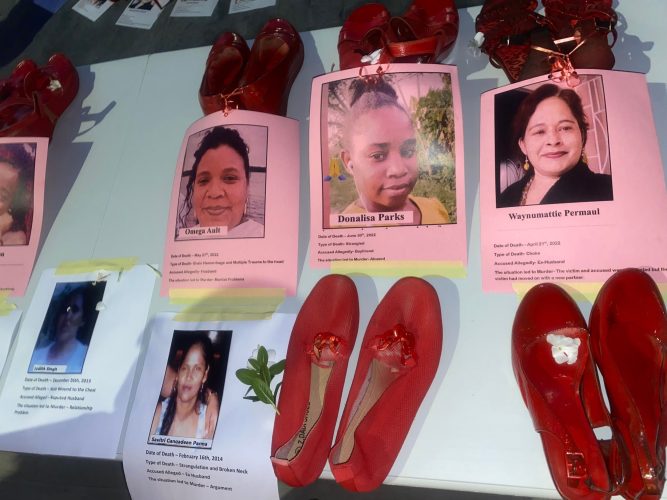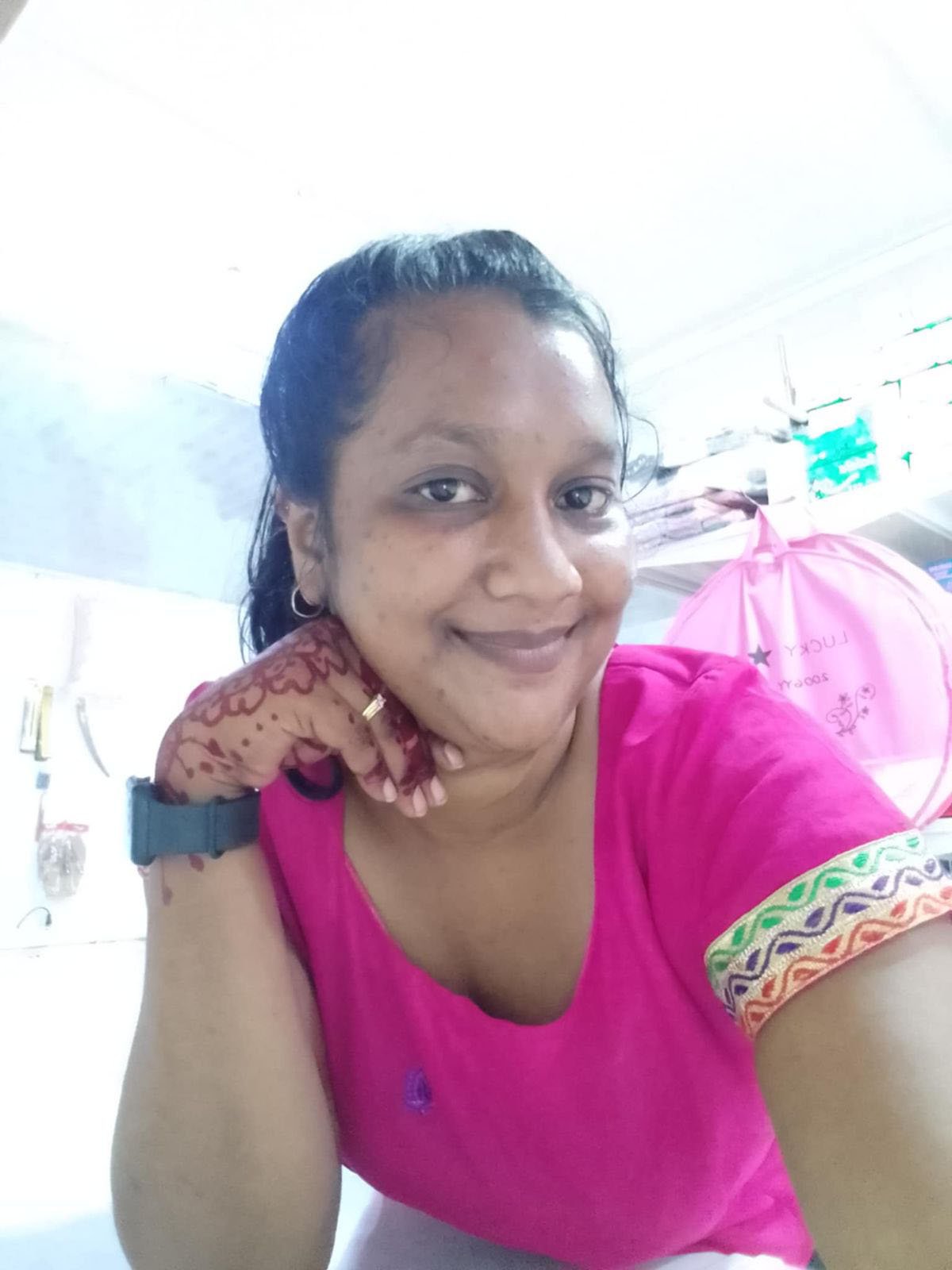With one woman fighting for her life after being brutally knifed and chopped allegedly by her fiancé and another chopped to death by her partner there is no question that intimate partner violence remains a serious problem in Guyana and to shine a light on this scourge a ‘Red Shoe’ project was hosted at Kingston Seawall Esplanade on Monday
The project, which took the form of a display of shoes, each pair representing the life of a woman who has been affected by gender-based violence, was hosted by the Civil Society National Reference Group (CSNRG) in collaboration with UN Guyana and the Women and Gender Equality Commission (WGEC).
While 28-year-old Thagewantie Motie, who died days after she was brutally chopped by her abusive reputed husband Uram Doorbassa who later died by suicide, and Leticia Reynolds, who is fighting for her life in hospital, were not able to tell their stories on Monday other victims took to the podium to share the devastating effects of gender-based violence

The launch of the project coincided with the observance of International Day for the Elimination of Violence Against Women and the start of #16DAYS of activism against gender-based violence.
Chairperson of WGEC Indra Chandarpal in her remarks on Monday recalled that in 1989 domestic violence was largely regarded as a private matter, with societal indifference prevailing. But with reports indicating that two out of five women were victims of violence, increased scrutiny was prompted from the women’s movement and advocacy groups. However, despite ongoing discussions, the absence of protective laws left many feeling their efforts were futile.
This led to the enactment of domestic violence legislation in 1996 and marked a significant shift, criminalizing acts of violence against any spouse. This change reflected a growing societal awareness and engagement, leading to increased involvement. The 1996 Domestic Violence Act was earlier this year replaced by the Family Violence Act.
Meantime, High Commissioner of the United Kingdom, Jane Miller emphasized that “one death is one death too many.” She acknowledged the efforts of various organisations and non-governmental organisations (NGOs) but stressed that change begins within communities.
“While it’s scary sometimes to intervene when someone is going through violence, violence doesn’t start with the hitting, actually, a woman being touched or molested doesn’t start with just [that] it didn’t get to that stage. It starts with emotional abuse. It starts with all kinds of things where it’s all about control,” she pointed out.
According to Miller, in many communities, a troubling pattern persists where women suffering from repeated abuse are often urged by their families to return to their husbands, under the misguided belief that doing so will prevent embarrassment and shame. This harmful practice not only perpetuates the cycle of violence but also silences the voices of victims.
Attitudes
Miller stressed that such attitudes must change, calling for a collective commitment to listen not only to women but also to all individuals affected by domestic abuse. It is imperative, she said, for communities to recognize the gravity of this issue and take decisive action to protect vulnerable members rather than pushing them back into harmful situations.
The British High Commissioner also recognised that both men and women suffer from domestic abuse, citing statistics that reveal “85% of women suffer domestic abuse, and 15% are men.”
In the United Kingdom, she said legislative measures such as the Domestic Abuse Act of 2010 and 2021 have been implemented to address these issues seriously. Miller praised the role of family liaison officers and trained police personnel who are now better equipped to handle reports of domestic violence without bias.
“They need to take it seriously,” she urged, regardless of the victim’s circumstances.
And Jean Njeri Kamau, the UN Resident Co-ordinator in Guyana, referenced the death of Motie.
“With her loss, we as a society have been robbed of a young woman whose potential contributions… could have enriched her community and indeed her country,” Kamau stated, emphasising the profound societal impact of such violence.
She noted too, that this incident is not isolated as women and girls continue to face alarming rates of violence globally, as “140 women and girls die every day at the hands of their partner or close relative,” translating to one death every ten minutes.
Kamau expressed solidarity with those advocating for change during the International Day for the Elimination of Violence Against Women, describing events like the red shoe gathering as “a powerful symbol of solidarity, resilience, and hope.”
She underscored the importance of integrated services for victims, referencing the launch of a Justice and Hope Centre that provides comprehensive support in Region Three (Essequibo Island West Demerara). “In a one-stop centre, you have access to medical care, police services, psychological support, social support… that would save victims of violence the added trauma of accessing services,” she explained.
As she reflected on the systemic nature of gender-based violence, Kamau called for collective action: “It requires all of us… to engage in dialogue and undertake deliberate corrective actions to deliver tangible and meaningful change.”
She underscored the critical need to address gender-based violence as a systematic violation of human rights rather than merely a domestic issue. “For 25 years, we have raised awareness of gender-based violence… affecting individuals, families, communities, and nations,” she stated, highlighting the pervasive nature of this issue. She pointed out that deep-rooted norms, stigma, cultural practices, and economic inequality continue to drive violence against women and girls.
As the global community prepares to celebrate the 30th anniversary of the Beijing Declaration and Platform for Action next year, Kamau called for urgent action and account-ability in addressing gender-related killings worldwide. “We can and we must fulfill the promise of the Beijing Platform for Action and the Sustainable Development Goals,” she assert-ed. This collective responsibility extends to leaders, civil society, governments, and individuals alike, urging everyone to engage in dialogue and undertake deliberate corrective actions for meaningful change.
The UN system is committed to supporting efforts in Guyana to combat gender-based violence by strengthening data collection, enhancing legal frameworks, and expanding access to essential services, she said. Kamau underscored the importance of integrated support systems for victims, stating that these initiatives are crucial for understanding and addressing the ongoing challenges related to gender-based violence.





